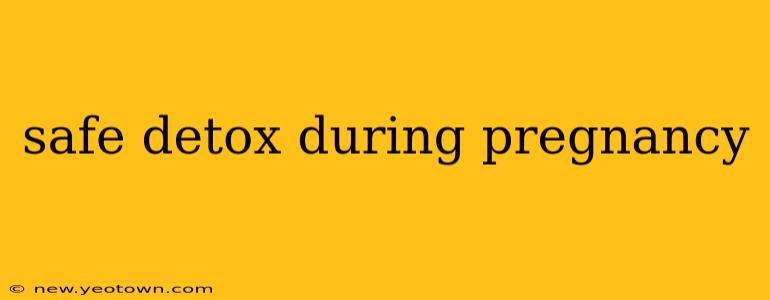Navigating Detox During Pregnancy: A Journey Towards Wellness
Pregnancy is a transformative journey, a time of incredible change and growth. While the focus naturally shifts to nurturing a developing baby, many expectant mothers find themselves questioning the role of detoxification in their well-being. The truth is, a "detox" during pregnancy isn't about drastic cleanses or restrictive diets; it's about making conscious, informed choices that support both mother and child. This isn't a one-size-fits-all approach; always consult your healthcare provider before making significant dietary or lifestyle changes.
This guide will explore the nuances of safe detoxification during pregnancy, addressing common questions and misconceptions. Remember, your primary focus should always be on creating a healthy environment for your baby's development.
What is a safe detox during pregnancy?
A safe detox during pregnancy isn't about rapid weight loss or extreme measures. It’s about optimizing your body's natural detoxification processes through healthy lifestyle choices. This primarily involves focusing on nutrient-rich foods, staying hydrated, and managing stress effectively. Avoid any products or programs claiming rapid results or miraculous effects; these are often unsubstantiated and potentially harmful.
What are the risks of detoxing during pregnancy?
Many detox programs involve restrictive diets, potentially depriving your body and your growing baby of essential nutrients. Some detox products contain ingredients that haven't been adequately tested for safety during pregnancy, potentially posing risks to fetal development. Furthermore, rapid weight loss, often associated with detox programs, can be detrimental to both maternal and fetal health.
Are there any natural ways to support detoxification during pregnancy?
Absolutely! Supporting your body's natural detoxification pathways relies on gentle, sustainable methods. Here are some key strategies:
- Hydration: Drinking plenty of water is crucial for flushing out toxins and supporting kidney function. Aim for at least eight glasses of water a day.
- Nutrient-Rich Diet: Focus on whole, unprocessed foods like fruits, vegetables, whole grains, and lean proteins. These provide essential nutrients for both you and your baby, supporting optimal bodily functions, including detoxification.
- Gentle Exercise: Regular, moderate exercise, as advised by your doctor, can improve circulation and support the body's natural cleansing processes. Avoid strenuous activities.
- Stress Management: Chronic stress can negatively impact your body's ability to detoxify effectively. Incorporate stress-reducing techniques like yoga, meditation, or spending time in nature.
- Adequate Sleep: Sufficient sleep is essential for overall well-being and allows your body to repair and regenerate, including detoxification processes.
What foods should I avoid during pregnancy?
Certain foods carry a higher risk of containing harmful substances, so it's important to avoid them during pregnancy:
- High-Mercury Fish: Limit or avoid high-mercury fish like swordfish, king mackerel, tilefish, and shark.
- Undercooked or Raw Meat and Eggs: These can contain harmful bacteria that can cause illness.
- Unpasteurized Dairy Products: These can contain harmful bacteria.
- Processed Foods and Sugary Drinks: These often lack nutritional value and can contribute to weight gain.
- Alcohol and Tobacco: These are extremely harmful to fetal development and should be completely avoided.
What should I do if I’m concerned about toxins in my environment?
If you're concerned about exposure to toxins in your environment (e.g., lead, pesticides), it's crucial to discuss your concerns with your doctor. They can advise on appropriate testing and mitigation strategies. Simple steps like regular cleaning and good ventilation can also help.
Should I take supplements for detoxification during pregnancy?
Before taking any supplements, always consult your doctor or a registered dietitian. While some supplements, like Vitamin D and folic acid, are crucial during pregnancy, others may not be necessary and could even be harmful.
Disclaimer: This information is for educational purposes only and should not be considered medical advice. Always consult with your healthcare provider before making any decisions related to your health or pregnancy. They can provide personalized guidance based on your individual needs and circumstances. Your health and the health of your baby are paramount; prioritize safety and seek professional medical advice.

